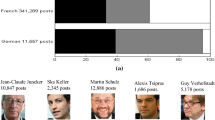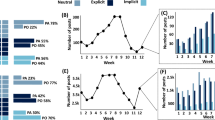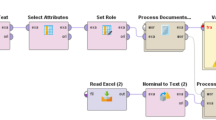Abstract
Twitter has emerged as outstanding and most prominent social media in today’s technological age. The data proliferates in quick and words with its activities trigger get fast responses from the users. This platform is perfect for promoting political perspectives, particularly when election campaigns are on its peak. Political trends on Twitter media has been contemplated in the course of recent years. In the past research, both supervised and unsupervised methodologies have been used to analyze the Twitter trends. Most of the Tweet classification approaches utilized built in Dictionaries, Naïve Bayes, K-Nearest Neighbors (KNN), decision tree and Support Vector Machines (SVM) classifiers. However, in case of democratic election these trends can be mined to predict the winning party. However, all such approaches produce poor results due to language issues, low accuracy, limited access to internet and lower literacy rate in less developed countries such as Pakistan. This research study, find the best possible way for collection of tweets related to different political parties and build a prediction model that may analyze sentiments and opinions expressed by peoples in their Tweets. In this research work, a prediction based model along with novel similarity measure has been proposed to predict the election results of political parties in Pakistan. The proposed work is composed of data collection, preprocessing, aspect extraction, aspect refinement and final prediction using Bayesian theorem. Form the experimental results, it is concluded that proposed approach perform better than existing techniques by obtaining almost 98% accuracy and efficiently cover the limitations of existing studies.








Similar content being viewed by others
References
Agarwal, A., & Toshniwal, D. (2018). Application of Lexicon based approach in sentiment analysis for short tweets. International Conference on Advances in Computing and Communication Engineering (ICACCE), 2018, 189–193.
Salunkhe, P., Surnar, A., & Sonawane, S. (2017). A review: Prediction of election using Twitter sentiment analysis. International Journal of Advanced Research in Computer Engineering & Technology (IJARCET), 6(5), 723.
Nawaz, A., Asghar, S., & Naqvi, S. H. A. (2019). A segregational approach for determining aspect sentiments in social media analysis. The Journal of Supercomputing, 75(5), 2584–2602.
Singh, A. K., Gupta, D. K., & Singh, R. M. (2017). Sentiment analysis of Twitter user data on Punjab legislative assembly election, 2017. International Journal of Modern Education and Computer Science, 9(9), 60.
Wicaksono, A. J., & others. (2016). A proposed method for predicting US presidential election by analyzing sentiment in social media. Science in Information Technology (ICSITech), 2016 2nd International Conference On, 276–280.
Hoang, T., Cher, P. H., Prasetyo, P. K., & Lim, E. P. (2016, December). Crowdsensing and analyzing micro-event tweets for public transportation insights. In 2016 IEEE International Conference on Big Data (Big Data) (pp. 2157–2166). IEEE.
Razzaq, M. A., Qamar, A. M., & Bilal, H. S. M. (2014). Prediction and analysis of Pakistan election 2013 based on sentiment analysis. Proceedings of the 2014 IEEE/ACM International Conference on Advances in Social Networks Analysis and Mining, 700–703.
Mahmood, T., Iqbal, T., Amin, F., Lohanna, W., & Mustafa, A. (2013). Mining Twitter big data to predict 2013 Pakistan election winner. Multi Topic Conference (INMIC), 2013 16th International, 49–54.
Almatrafi, O., Parack, S., & Chavan, B. (2015). Application of location-based sentiment analysis using Twitter for identifying trends towards Indian general elections 2014. Proceedings of the 9th International Conference on Ubiquitous Information Management and Communication.
Singh, P., Sawhney, R. S., & Kahlon, K. S. (2017). Forecasting the 2016 US Presidential Elections Using Sentiment Analysis. Conference on E-Business, e-Services and e-Society, 412–423.
Sharma, P., & Moh, T.-S. (2016). Prediction of indian election using sentiment analysis on hindi twitter. Big Data (Big Data), 2016 IEEE International Conference On, 1966–1971.
Salunkhe, P., & Deshmukh, S. (2017). Twitter based election prediction and analysis. International Research Journal of Engineering and Technology (IRJET), 4(10), 539–544.
Wang, L., & Gan, J. Q. (2017). Prediction of the 2017 French election based on Twitter data analysis. 2017 9th Computer Science and Electronic Engineering (CEEC), 89–93.
Kassraie, P., Modirshanechi, A., & Aghajan, H. K. (2017). Election Vote Share Prediction using a Sentiment-based Fusion of Twitter Data with Google Trends and Online Polls. DATA, 363–370.
Ramteke, J., Shah, S., Godhia, D., & Shaikh, A. (2016). Election result prediction using Twitter sentiment analysis. 2016 International Conference on Inventive Computation Technologies (ICICT), 1, 1–5.
Liu, D., & Lei, L. (2018). The appeal to political sentiment: An analysis of Donald Trump’s and Hillary Clinton’s speech themes and discourse strategies in the 2016 US presidential election. Discourse, Context & Media, 25, 143–152.
Kim, S. (2018). Populism and anti-populism in the 2017 Dutch, French, and German elections: A discourse and hegemony analytic approach. MISC.
Soon, C., & Samsudin, S. N. (2016). General Election 2015 in Singapore: What social media did and did not do. The Round Table, 105(2), 171–184.
Lewis-Beck, M. S., & Tien, C. (2016). The Political Economy model: 2016 US election forecasts. PS: Political Science & Politics, 49(4), 661–663.
Gayo-Avello, D., Metaxas, P. T., & Mustafaraj, E. (2011). Limits of electoral predictions using twitter. Fifth International AAAI Conference on Weblogs and Social Media.
Bermingham, A., & Smeaton, A. (2011). On using Twitter to monitor political sentiment and predict election results. Proceedings of the Workshop on Sentiment Analysis Where AI Meets Psychology (SAAIP 2011), 2–10.
Singh, P., & Sawhney, R. S. (2018). Influence of twitter on prediction of election results. In Progress in Advanced Computing and Intelligent Engineering (pp. 665–673). Springer.
Karami, A., Bennett, L. S., & He, X. (2018). Mining public opinion about economic issues: Twitter and the us presidential election. International Journal of Strategic Decision Sciences (IJSDS), 9(1), 18–28.
Jungherr, A. (2016). Twitter use in election campaigns: A systematic literature review. Journal of Information Technology & Politics, 13(1), 72–91.
Parackal, M., Mather, D., & Holdsworth, D. (2018). Value-based prediction of election results using natural language processing: A case of the New Zealand General Election. International Journal of Market Research, 60(2), 156–168.
Nooralahzadeh, F., Arunachalam, V., & Chiru, C.-G. (2013). 2012 Presidential Elections on Twitter--An Analysis of How the US and French Election were Reflected in Tweets. 2013 19th International Conference on Control Systems and Computer Science, 240–246.
Ceron, A., Curini, L., Iacus, S. M., & Porro, G. (2014). Every tweet counts? How sentiment analysis of social media can improve our knowledge of citizens political preferences with an application to Italy and France. New Media & Society, 16(2), 340–358.
Driscoll, K., Ananny, M., Bar, F., Guth, K., Kazemzadeh, A., Leavitt, A., & Thorson, K. (2013). Big bird, binders, and bayonets: Humor and live-tweeting during the 2012 US presidential debates. AoIR Selected Papers of Internet Research, 3.
Wills-Otero, L. (2019). Elections and Parties in Latin America: Ruptures and Continuities at the End of a Decade. SciELO Brasil.
Enli, G. (2017). Twitter as arena for the authentic outsider: Exploring the social media campaigns of Trump and Clinton in the 2016 US presidential election. European Journal of Communication, 32(1), 50–61.
Yaqub, U., Chun, S., Atluri, V., & Vaidya, J. (2017). Sentiment based analysis of tweets during the us presidential elections. Proceedings of the 18th Annual International Conference on Digital Government Research, 1–10.
Jacobs, K., & Spierings, N. (2016). Social Media in Politics: The Netherlands from a Comparative Perspective. In Social Media, Parties, and Political Inequalities (pp. 45–73). Springer.
Murthy, D., & Petto, L. R. (2015). Comparing print coverage and tweets in elections: A case study of the 2011–2012 US Republican primaries. Social Science Computer Review, 33(3), 298–314.
Asemah, E. S. (2017). Use of social media in the 2015 presidential election in Nigeria. Mass Communicator: International Journal of Communication Studies, 11(3), 4–11.
Hodson, J., & Petersen, B. (2019). Diversity in Canadian election-related Twitter discourses: Influential voices and the media logic of# elxn42 and# cdnpoli hashtags. Journal of Information Technology & Politics, 16(3), 307-323.
Ceron, A., Curini, L., & Iacus, S. M. (2015). Using sentiment analysis to monitor electoral campaigns: Method matters evidence from the United States and Italy. Social Science Computer Review, 33(1), 3–20.
Li, T., Li, J., Liu, Z., Li, P., & Jia, C. (2018). Differentially private Naive Bayes learning over multiple data sources. Information Sciences, 444, 89–104.
Whitford, L. (2014). RhymeZone Retrieved Retrieved March, 21, 2020, from https://doi.org/10.1108/RR-10-2013-0265/full/html.
Author information
Authors and Affiliations
Corresponding author
Ethics declarations
Conflict of interest
Authors have no conflict of interest.
Additional information
Publisher's Note
Springer Nature remains neutral with regard to jurisdictional claims in published maps and institutional affiliations.
Rights and permissions
About this article
Cite this article
Nawaz, A., Ali, T., Hafeez, Y. et al. Mining public opinion: a sentiment based forecasting for democratic elections of Pakistan. Spat. Inf. Res. 30, 169–181 (2022). https://doi.org/10.1007/s41324-021-00420-7
Received:
Revised:
Accepted:
Published:
Issue Date:
DOI: https://doi.org/10.1007/s41324-021-00420-7




